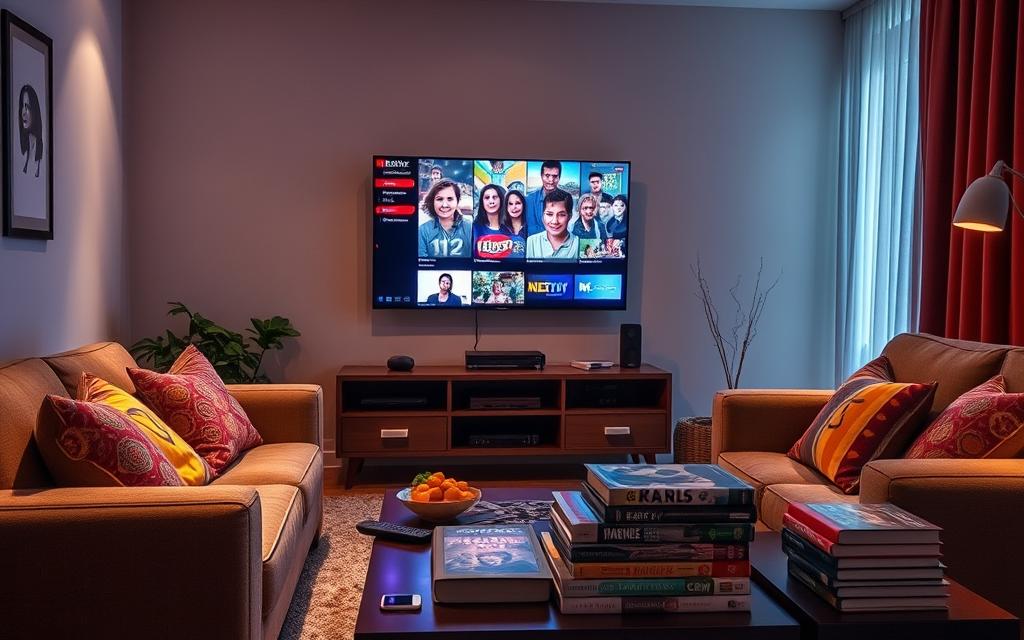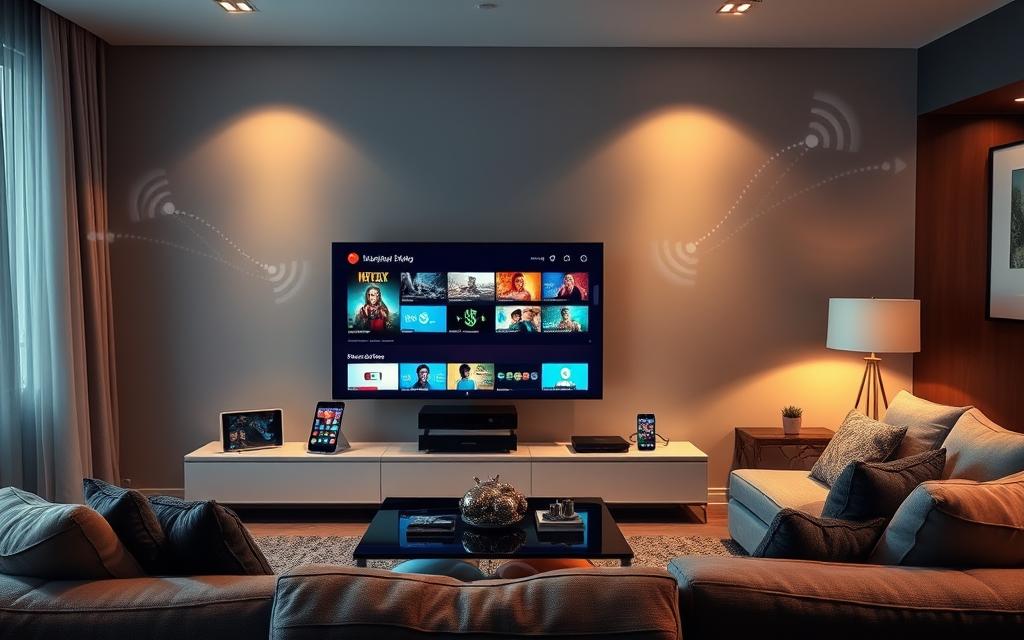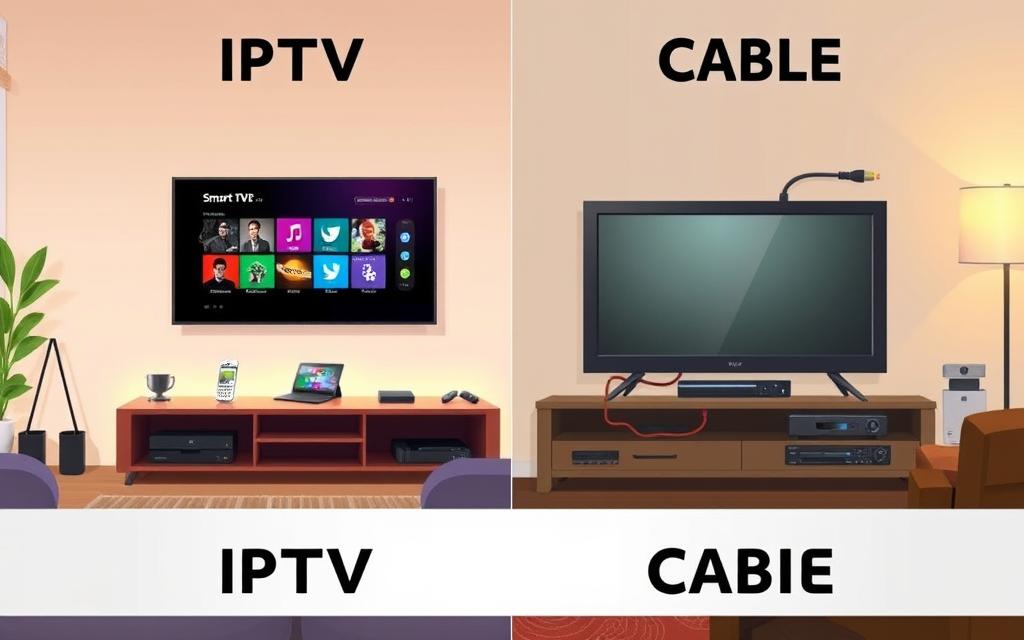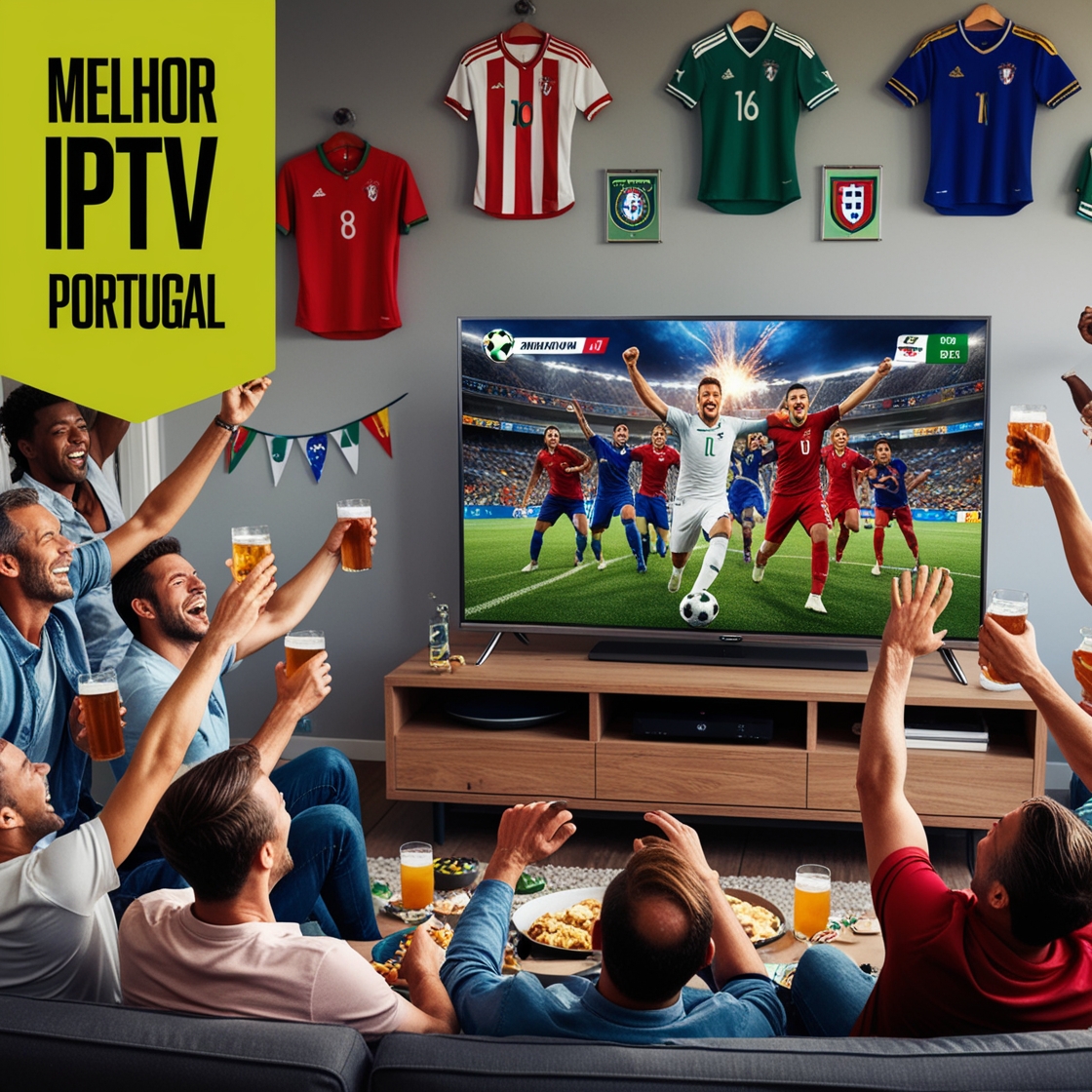Are you trying to decide between IPTV and cable TV for your home? More and more people are cancelling their cable subscriptions. They’re moving towards IPTV because of its features and the rise of online streaming. We’re here to look at what makes each option special. You’ll learn about the pros and cons. And find out which one will make your home entertainment better.
Key Takeaways
- IPTV is the top choice for 70% of users. They like its flexible plans more than cable’s contracts.
- About 55% of cable users enjoy packages that include internet and phone.
- IPTV offers way more international and niche shows—about 80% more than cable.
- 65% of IPTV users get personalized show recommendations, a rare feature in cable.
- With IPTV, viewers get much more control over what and how they watch.
- Cable TV often has initial costs for equipment, but IPTV just needs good internet.
- IPTV also has better quality streams, like 4K, and doesn’t get interrupted by bad weather.
Understanding Cable TV
Cable TV is key for home fun, growing quickly from its start. It was first made to improve TV signal in far places. Now, it uses coaxial or fiber-optic cables for many channels. This includes local shows and top-notch options, being essential in homes.
History and Evolution of Cable TV
Cable TV started to fix bad signal in rural spots. With new tech, it now sends high-quality video. This change made cable TV a big player in digital TV, offering lots to viewers.
How Cable TV Works
Cable TV sends signals through coaxial cables to houses. A set-top box decodes these for TV watching. It doesn’t need the internet, so it keeps good quality without buffering, even when many use it.
Advantages and Disadvantages of Cable TV
The main positives of cable TV include:
- Consistent picture quality: Without internet, it gives a steady watch.
- Reliable access: Great for places with good cable setup.
- Broad selection: Offers many channels, like live local shows.
But, there are negatives:
- High costs: Providers may charge for channels you don’t watch.
- Limited flexibility: Fewer choice options than other cable types.
- Equipment expenses: Might pay more for boxes and setup.
Though cable TV is dependable, some look for other options with more choice and lower costs. Knowing these ups and downs helps decide what’s best for your leisure.

Exploring IPTV Technology
Internet Protocol Television (IPTV) is changing the way we enjoy shows and movies. It sends content over the internet to various devices. This means you can watch a wide range of programs anywhere, anytime.
What is IPTV?
IPTV means watching TV through the Internet Protocol (IP) instead of traditional ways like cable. It offers great streaming of videos and audios online. So, you get live TV and lots of on-demand shows easily.
How IPTV Differs from Traditional TV
IPTV and regular cable TV deliver content differently. IPTV lets you choose channels more freely and works on many devices like smart TVs, phones, and tablets. This is unlike cable which needs set-top boxes.
Traditional TV often combines services in fixed bundles. But IPTV offers a tailored experience to suit what you like to watch.
Benefits of Using IPTV
IPTV has many perks that make watching TV better. Some key advantages include:
- Vast Library of On-Demand Content: You get more on-demand shows with IPTV than with cable.
- High-Quality Streaming: IPTV provides HD and 4K streaming, giving you clearer images than cable.
- Interactive Features: IPTV has cool features like chatting live with other viewers and instant replays.
- Cost-Effective: It often costs less than cable while offering HD quality.

Deciding on IPTV depends on what you want, like easy use and custom viewing. IPTV’s benefits might lead to a new and exciting way to watch TV at home.
IPTV vs Cable: A Comparative Overview
In the debate of IPTV vs cable, comparing features and benefits is key. With the rise of streaming, many think about cord-cutting instead of traditional cable. This choice can really change the way you watch TV.
Key Differences Between IPTV and Cable
The key differences between IPTV and cable are many. Cable TV gives a wide range of channels easily. But, IPTV is more flexible and often cheaper. IPTV uses fiber optics for high-quality video and less interruption.
Cable provides lots of channels with less buffering thanks to dedicated lines.
Choosing the Right Option for Your Needs
Choosing between IPTV and cable depends on what you like to watch and your budget. If you want many shows on demand, IPTV is great. It works well with streaming services like Netflix and Hulu. But, if you want many channels without hassle, cable might be better despite its decline.
| Feature | IPTV | Cable TV |
|---|---|---|
| Content Delivery | Private networks with fewer interruptions | Dedicated lines with consistent quality |
| Channel Selection | Flexible on-demand options | Hundreds of channels available |
| Setup Requirements | Set-top box, requires broadband | Typically more complex installation |
| Monthly Costs | Can be higher with bundled services |
Cost Analysis of IPTV and Cable
When looking at IPTV vs cable, it’s key to consider costs. Cable usually has higher setup and monthly fees, which might turn people away. On the other hand, IPTV often comes with clearer pricing and fewer unexpected charges.
Initial Setup Costs
Cable TV setup can be pricey, sometimes over $100, plus ongoing charges. IPTV, however, often cuts these expenses, making it easier and cheaper to start watching. This leads many to choose IPTV, which aims to lower initial costs without sacrificing quality.
Monthly Subscription Fees and Hidden Charges
Traditional cable can cost up to $144 a month, with extra taxes and fees adding $30 to $50. Cable users might feel they’re not getting their money’s worth due to high fees. Streaming services, though, have a wide range of prices, with ad-free options around $71. This can lead to subscription fatigue, as people juggle multiple services without saving much.
Long-term Savings with IPTV
IPTV provides a more budget-friendly option over time. It cuts down on hefty contracts and equipment costs, appealing to those looking to save. Plus, IPTV’s flexibility lets viewers tailor their experience to fit their budget and tastes.
| Service Type | Monthly Cost | Setup Cost | Equipment Rental Fees | Hidden Fees |
|---|---|---|---|---|
| Cable TV | $144 (avg.) | $100+ | $10-$20/month | $30-$50/month |
| IPTV | $71 (avg.) | Minimal | Generally none | Low, if any |
| Streaming Services | $97-$100 (avg.) | Minimal | Generally none | Occasional subscription fees |
To conclude, IPTV often beats cable in cost, ease of setup, and clear pricing. As viewer habits change, IPTV is set to become the top choice for those wanting to save money and enjoy greater flexibility.
Content Availability and Channel Selection
Cable tv and IPTV both offer many choices to fit what people like to watch. Cable tv gives you local and premium channels. You can watch live shows and special programs. But, it often means signing long-term deals, which can be a downside if you change your mind early. This setup can limit your options.
The Range of Channels Offered by Cable TV
People with cable tv get to enjoy a wide range of channels. These include news, sports, and entertainment. Cable lets you watch live TV reliably. Yet, the strict contracts and a growing love for watching anytime challenge cable’s traditional role.
IPTV’s On-Demand Content and Niche Channels
IPTV changes how you watch shows with on-demand services and special interest channels. It offers plans for every budget. IPTV brings a new level of choice unlike cable’s fixed plans. It lets different people watch what they want on various devices at the same time. This flexibility comes with channels for documentaries, live sports, and music.
Comparing Live TV Options
Cable tv is traditional for live TV, but IPTV stands out by using the internet. It streams in high quality, even if the internet is up and down. This gives fewer breaks in watching. IPTV offers many choices and personalized viewing. This makes IPTV a tough competitor in home entertainment today. With people wanting more tailored and varied shows, the difference between these services is clear.
User Experience and Interface
User experience is key in today’s TV watching habits. Cable TV feels old because it uses basic guides that don’t grab our interest. IPTV, however, changes the game with smart, easy-to-use interfaces. These are designed to learn what you like and make watching TV better.
How to Navigate Cable TV Interfaces
Using cable TV can be a hassle. Its old-style guides mean you have to keep flipping channels to find what you want. You might face problems like:
- No recommendations just for you.
- Searching for shows is hard.
- The experience varies too much on different devices.
These issues make cable TV less enjoyable compared to new options.
IPTV User Experience and Customization Features
IPTV gives a much better user experience with features like:
- Watching shows when you want.
- Easy streaming on TVs, tablets, and smartphones.
- Choices in what to watch, based on your likes.
This ability to choose is important because people want TV that suits their life. IPTV uses special software to know what audiences like. This helps to suggest shows you might enjoy. As what we watch changes, IPTV keeps up. It offers viewing on various devices and fun ways to interact.
Picture and Sound Quality Comparison
When you’re picking what to watch, both the picture and sound are super important. Let’s dive into how cable TV and IPTV compare. We’ll look at HD and 4K, and see how they make watching shows better.
High Definition (HD) vs. 4K Content
Cable TV is great for HD channels but often lacks 4K options. IPTV, on the other hand, gives you lots of 4K choices, making everything look sharper. A user even said that all streams are in 4K, with a smooth 60 frames per second. So, if you have a 4K TV, IPTV might just take your watching experience to the next level.
Factors Affecting Streaming Quality in IPTV
Several things can affect how good your IPTV looks and sounds. Fast internet means better quality. If you’ve got a big TV, you might notice when the quality dips. Some channels only stream in 720p, making things less sharp.
But, there’s good news! AI technology can improve the picture, even making it look close to 1080p. This is especially great for 4K TV owners. Adjusting some settings, like hardware decoding, can also help make your stream look better.
Reliability and Performance Factors
When looking into home entertainment, the reliability and performance of choices play a big role. Cable TV is famous for being stable. It generally does a great job of giving an uninterrupted service, even in bad weather. This stability comes from its strong infrastructure. It makes cable a reliable choice for those who value consistent viewing.
Stability of Cable TV Service
Cable TV is known for its impressive performance, with strong connections and few interruptions. The way cable services are managed helps provide high-quality content smoothly. This means viewers can enjoy their shows without the glitches often seen in internet streaming.
Challenges Facing IPTV Services
In contrast, IPTV’s success depends on internet quality, which can bring challenges. Even though IPTV runs on a managed network for better service quality, low internet speed or overcrowded networks can cause delays. These problems can greatly hinder the streaming quality.
The type of cables used is important too. For example, using superior Cat6 cables allows speeds up to 1 Gbps. Cat6a cables can even go up to 10 Gbps, making IPTV more reliable. To get the best performance, users should check their LAN cables are set up correctly and of the right length. This careful attention ensures a smooth streaming experience.
Legal Considerations and Privacy Issues
It’s essential to know how the law affects IPTV and cable TV for users today. Many rules guide how each service works. They influence what you can watch and your rights and duties.
Regulations Governing Cable TV
Cable TV follows strict laws about what content they can show. These laws make sure they meet FCC rules, which keep the competition fair and protect you. So, cable companies must be careful with what they show, which keeps subscribers safe.
IPTV: Legal Concerns and Data Privacy
IPTV has some legal issues that aren’t as straightforward. Recently, there’s been a rise in legal cases due to IPTV streaming without a license. This can be a big risk, including legal problems for those using these uncertain services, noted for their low prices and secrecy.
For example, illegal streaming in the US became a serious crime in 2020, with harsh penalties. The UK has tough punishments too, with up to ten years in jail for infringing users and providers.
Using these services also exposes you to other dangers like losing money and privacy issues. Risks include unwanted data collection and threats to your device. Picking a trustworthy IPTV provider is key to enjoy safe and fun streaming. For better online safety, using tools like ExpressVPN is suggested. They add extra security while you access IPTV.
| Aspect | Cable TV | IPTV |
|---|---|---|
| Regulatory Oversight | Strict FCC regulations | Ambiguous legal environment |
| Legal Risks | Lower risk for consumers | High risk with illegal services |
| Potential Penalties | Varies by state and service | Up to 10 years in prison for illegal usage |
| Data Privacy | Higher consumer protection | Data harvesting concerns |
| Recommended Action | Regular updates and compliance | Use of reliable providers & VPNs |
Conclusion
Picking between IPTV and cable will change how you enjoy TV at home. Each has its pros and cons. IPTV uses the internet for showing shows and movies, offering more choice and a better fit for what you like than cable. It lets you pick from lots of movies and shows on-demand. This means you can make your streaming just right for you, making watching TV more fun.
Also, 65% of people like IPTV more because it has so much available anytime they want. Plus, moving to IPTV from cable usually saves 30% of the cost. This shows more people are choosing cheaper ways to watch TV. Knowing about the latest in TV can help you pick what matches how you like to watch shows and movies.
In today’s world, having TV that’s just right for you is key. IPTV is great for many screens, clear images, and lets you interact more with what you watch. Being up-to-date on these choices means you can choose the best TV setup for you. You’ll get a lot of joy and new stuff to watch.
FAQ
What are the main differences between IPTV and cable TV?
Is IPTV more cost-effective than traditional cable?
Can IPTV be accessed on multiple devices?
What quality of content can I expect from IPTV?
Are there legal concerns associated with using IPTV?
How do content offerings differ between IPTV and cable?
What should I consider when choosing between IPTV and cable?
What happens if my internet connection is slow with IPTV?
Is it possible to cancel my IPTV service easily?
Source Links
- Making an Informed Choice for Home Entertainment – Jaze Networks
- The Moshville Times – IPTV Vs Cable TV: Key Differences to Know Which is Better?
- IPTV vs. Cable TV: Which is better? – GeeksforGeeks
- IPTV vs Cable TV: A Comparison Guide | Content Sprout
- Unlocking the Future of Entertainment: Exploring Live Streaming Features on IPTV vs. Cable TV
- IPTV vs. Traditional Cable: Which is Better?
- How an IPTV TV System compares to Cable, Satellite, and OTT – Nevron
- Cable, Satellite, IPTV & OTT Streaming: What’s the Difference? – BroadbandNow
- The Shift from Traditional Cable TV to OTT and IPTV
- Streaming vs. Cable: Which One Saves You More Money?
- Comparison Between IPTV and Traditional Cable Television
- Why IPTV Is Superior to Traditional Cable Television – Infomir USA/Canada Retail Shop
- 5 Advantages for IPTV Consumers. Key Benefits of IPTV Platform
- What is IPTV? How IPTV works? Best IPTV Devices, Services, and more!
- IPTV quality
- QAM Channels vs. IPTV – Comcast XFINITY TV
- Exploring the Differences: IPTV vs OTT Streaming
- How LAN Cables Affect IPTV Streaming Quality
- Unlicensed Public Internet Streaming Is a Legal Work in Progress
- Is IPTV Legal? A Closer Look at IPTV Law in 2024
- IPTV vs. Traditional Cable/Satellite for Live Streaming | Top Best IPTV Streaming Service Providers
- IPTV vs. Cable TV: Understanding the Advantages and Future of Television




